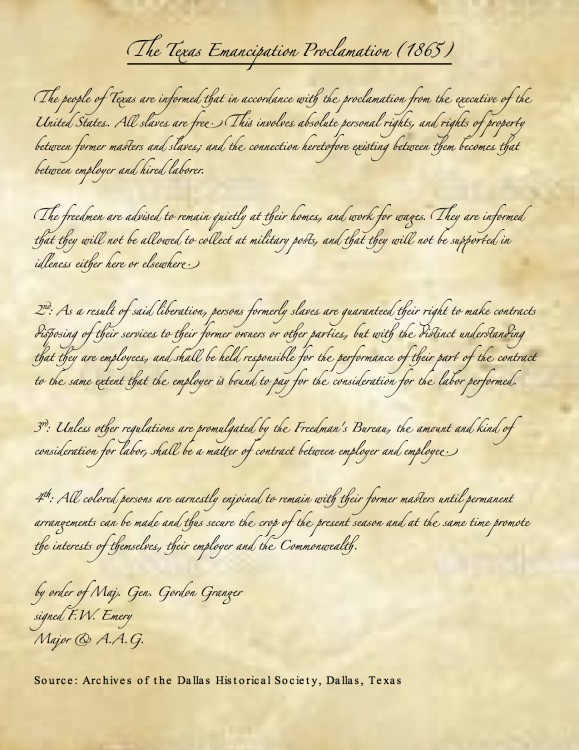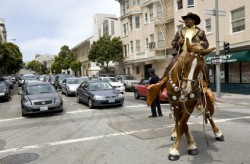Juneteenth: A New Birth of Freedom
Share
Explore Our Galleries
Breaking News!
Today's news and culture by Black and other reporters in the Black and mainstream media.
Ways to Support ABHM?
From the Smithsonian Magazine
The Fourth of July isn’t the only Independence Day in America.

On June 19, 1865, Union General Gordon Granger arrived at Galveston, Texas, bringing news to the town that the Civil War had ended and that all slaves were free. This was nearly two and a half years after President Lincoln issued the Emancipation Proclamation. Before long, the former slaves in southeastern Texas began to celebrate June 19th as Emancipation Day. Eventually, they shortened the name to Juneteenth….
But Juneteenth isn’t just a historical holiday; modern celebrations are increasing throughout the country, said Cliff Robinson, founder of Juneteenth.com, a Web site that allows individuals or groups to post information and photos from Juneteenth celebrations.
“We’ve had people from all 50 states and around the world posting on our site,” Robinson said. “I’ve seen some celebrations that try to make it historic in terms of costume, but today it can be anything: a family dinner, a backyard barbecue and everything to a concert downtown or a citywide parade. It has expanded.”

I spoke with Dr. William Wiggins Jr., professor Emeritus of Folklore at Indiana University and author of Jubilation: African-American Celebrations in the Southeast, about the history and future of Juneteenth.
Why did it take so long for word of the Emancipation Proclamation to reach Texas?
One of the popular legends associated with that is that Lincoln dispatched Union soldiers to move throughout the South to spread the word, and it took until the 19th of June.
But I think on the other end, you could perhaps say it took so long because of the resistance to emancipation itself. Texas was one of the last outposts of slavery and Galveston is sort of the epicenter. In fact, one of the last fights in the Civil War was done in Galveston and the Union forces were repelled. There had been a big resistance all along and it was because of this fact that word got slowly to east Texas. Then Gordon Granger was dispatched with a group of Union soldiers and landed at Galveston and spread the word and proceeded to go up into east Texas. He gave the executive order that slavery was no longer official and people had to compensate slaves for their labor. Texas was just sort of the outlier and took some time….
How did Juneteenth celebrations spread out of Texas?
The movement of this celebration was part of a larger group of emancipation days across the south. The first movement, right around WWII, was westward. So where you had black families moving to California from east Texas, and southwest Arkansas and Oklahoma, to work in the shipyards, or to work in the airplane factories, then Juneteenth started cropping up in those states.

When Dr. King had the Poor People’s March and Ralph Abernathy promised King (who died April 4, 1968) that this march would be completed and it was. So they made it to Washington and they set up a camp on the mall. Everything that could go wrong did and they had to leave at the end of the summer. So how can you leave with some sense of honor? It was late June and there were people from all different states in that village for that summer, so they had a group from Texas and someone said ‘Why don’t we have a Juneteenth celebration,’ which again is a way to address poverty and freedom and harkening back to our past. They had this closing celebration, which was held on that day, and a large number of entertainers performed.

My theory is that these delegates for the summer took that idea of the celebration back to their respective communities. So I know, for example, there was one in Milwaukee1,and looking at the newspapers after that summer, they started having regular Juneteenth celebrations. The Chicago Defender had an editorial that it should be a regular idea. My feeling is that because it was used to close the Poor Peoples Campaign that the idea and so forth was taken back by different participants in that march and it took root around the country. It has taken on a life of its own.
1Milwaukee, Wisconsin, home of America’s Black Holocaust Museum, has been celebrating Juneteenth for 42 years.
To read the full article, click here.
Read more about Juneteenth here.
Read more Breaking News here.









Comments Are Welcome
Note: We moderate submissions in order to create a space for meaningful dialogue, a space where museum visitors – adults and youth –– can exchange informed, thoughtful, and relevant comments that add value to our exhibits.
Racial slurs, personal attacks, obscenity, profanity, and SHOUTING do not meet the above standard. Such comments are posted in the exhibit Hateful Speech. Commercial promotions, impersonations, and incoherent comments likewise fail to meet our goals, so will not be posted. Submissions longer than 120 words will be shortened.
See our full Comments Policy here.